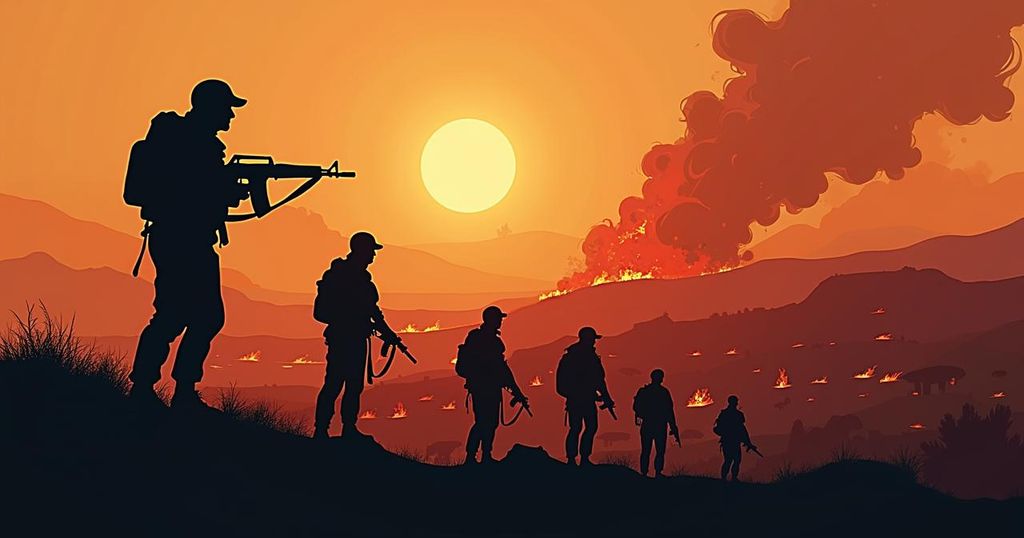Escalating Conflict: IDF and Hezbollah Engage in Intense Hostilities Amidst Ongoing Israel-Gaza War

Fierce clashes between Israeli forces and Hezbollah have escalated greatly, with the IDF reporting the death of numerous Hezbollah operatives. U.N. spokesperson Jeremy Laurence criticized Israeli military tactics as mirroring those used in Gaza, stressing the severe humanitarian crisis in both locations. The broader regional dynamics are complicated by the protracted Israel-Gaza war and U.S. support for Israel, all amid a backdrop of historical conflict that dates back to the state’s establishment in 1948.
Intense hostilities have erupted between the Israel Defense Forces (IDF) and Hezbollah along the Israel-Lebanon border, as the IDF reported the elimination of at least 50 Hezbollah operatives amidst heightened military operations across southern Lebanon. In response to these developments, United Nations human rights spokesperson Jeremy Laurence expressed grave concerns regarding the conduct of the Israeli military. He denounced the IDF’s actions, claiming they mirror the military strategies employed in Gaza, and described the devastation encountered in both conflict zones as “beyond belief.” The ongoing Israel-Gaza war, now surpassing a year, has escalated tensions throughout the broader Middle Eastern region. It commenced on October 7, when Hamas militants executed an unprecedented assault on Israel, resulting in approximately 1,200 fatalities and the abduction of several civilians. In retaliation, Israel declared war on Hamas, initiating a ground invasion that has displaced the highest number of individuals in the region since the establishment of Israel in 1948. Notably, in July 2024, a significant strike resulted in the demise of Hamas leader Ismail Haniyeh, an attack attributed by Hamas to Israeli forces. Relations between Israel and Hezbollah, an Iranian-backed militant entity, have deteriorated considerably over the past year, leading to a marked increase in Israeli military incursions into southern Lebanon. Recent Israeli airstrikes have proven to be particularly lethal, contributing to over 1,400 casualties, including the death of Hezbollah’s enduring chief, Hasan Nasrallah. The Israel-Lebanon border has long been characterized by a legacy of violence, with roots that extend back to 1948. The humanitarian situation in the Gaza Strip continues to deteriorate, as Israel conducts one of the most devastating military campaigns of this century, resulting in tens of thousands of deaths and rendering at least half of the Gazan population in dire conditions akin to famine. Despite international appeals, Israel has largely resisted calls from its Western allies to facilitate the entry of increased humanitarian aid into the territory. The United States maintains its support for Israel by providing military assistance, financial aid, and strategically abstaining from or vetoing United Nations resolutions aimed at imposing cease-fires, despite noticeable tensions between Israeli Prime Minister Benjamin Netanyahu and certain U.S. political figures, inclusive of President Biden. Moreover, the historical context of the Israeli-Palestinian conflict is rooted in a profound and intricate web of distrust that predates the creation of Israel, encompassing events that have unfolded over decades.
The enduring conflict between Israel and Palestine has historical foundations that significantly predate the establishment of the state of Israel in 1948. Since then, tensions have escalated, leading to numerous confrontations and wars. The recent Israel-Gaza war, ignited by a major assault from Hamas, has drawn attention to the complexities of regional dynamics, including the relationship between Israel and Hezbollah. The involvement of various international actors, including the United States, adds another layer to the intricate geopolitical landscape, influencing military strategies and humanitarian situations in affected areas.
The conflict in Lebanon between the IDF and Hezbollah, alongside the ongoing Israel-Gaza war, underscores the intense and multifaceted nature of regional hostilities. With significant casualties on both sides and rising concerns from global entities such as the U.N., the situation displays a persistent cycle of violence that is deeply rooted in historical grievances and political tensions. The humanitarian implications of these conflicts remain dire, calling for urgent international attention and intervention.
Original Source: www.washingtonpost.com








